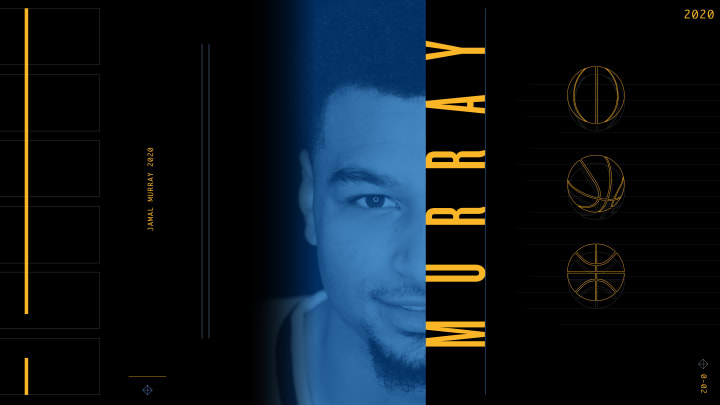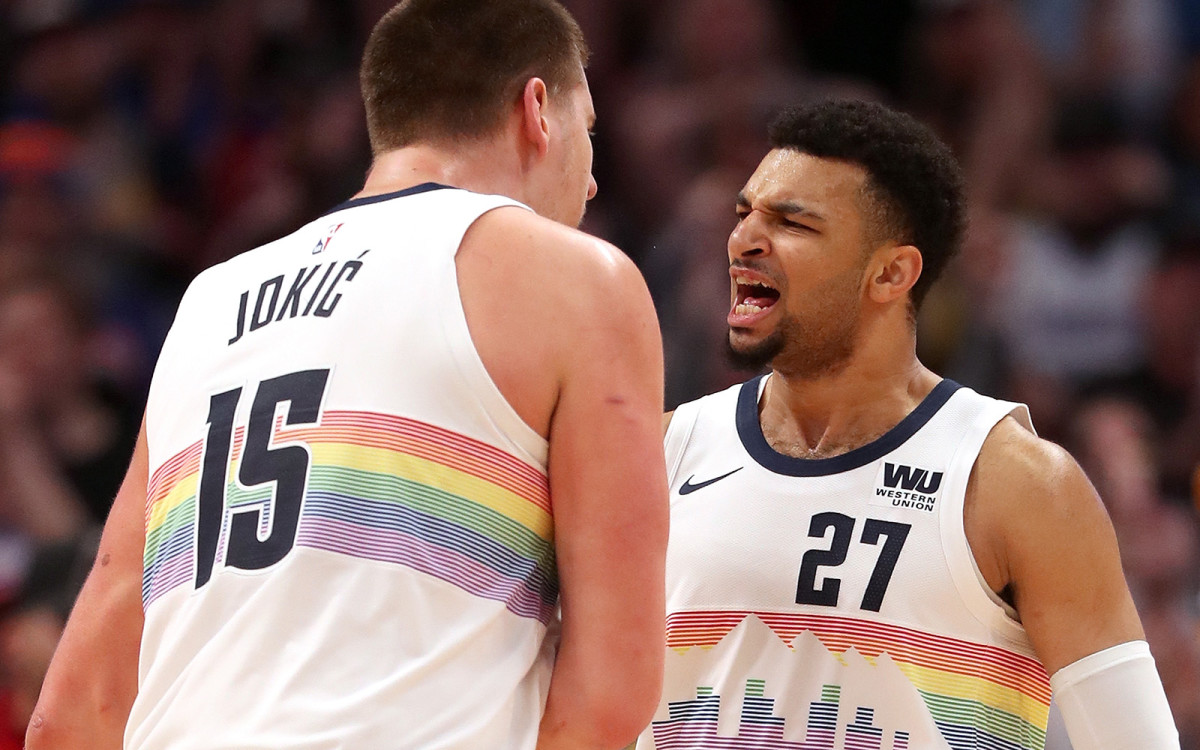NBA's 2020 Watch List: Do You Believe in Jamal Murray?

The basketball world just lived through the wildest NBA offseason of all time. Now we’re on the other side. A dozen stars have changed teams, contenders have been transformed all over the landscape, and next season's NBA looks more wide-open than it has been for the past 30 years. Now, as the basketball world passes the time at the end of the offseason, I can’t write another winners and losers column, and we can all survive without a final round of offseason grades. Instead, what follows is an attempt to imagine where things are headed. Who are the five most interesting players in next year's NBA? Whose stories will shape the league we're watching in 2020?
These are some answers at the end of July. Our five-part series began with Anthony Davis and continued with Joel Embiid. For part three, we examine Nuggets star Jamal Murray.

The West is wide open next year. This is something that will be repeated all summer long and all the way through the fall, and while the talking point may get old—depending on the extent of your addiction to consuming basketball coverage on the internet—there's no debating that one of the best things about next season is that nobody has any idea what half the league will look like.
The Clippers should be favorites, but they're also betting on two superstars with a sketchy injury history and a supporting cast that could absolutely regress after overachieving last season. The Lakers are making a similar bet on LeBron James and Anthony Davis, but their supporting cast looks half as reliable as what the Clippers working with. The Jazz have a great starting five on paper, but are we positive that Bojan Bogdanovic won't be Ryan Anderson 2.0? What if Donovan Mitchell is less Dwyane Wade and more Dion Waiters? Then there are a host of questions with the Warriors ... We'll deal with them Thursday. And the Rockets... good luck guessing what that will look like.
In any case, at the end of all this, the Denver Nuggets look like one of the safest bets on the board. The team won 54 games in 2019 and finished with the second-best record in the West. That gave way to first-round win over the Spurs in seven games and a second-round loss to the Blazers in seven games. For a team built around a 24-year-old center and a 22-year-old point guard, all of it was major progress. Everyone will be back next season. The team should be healthier. And after an offseason of changes elsewhere, continuity in Denver may give the Nuggets a leg up on the field. So, how good do we think Jamal Murray can be?
Nikola Jokic has earned the benefit of the doubt as the catalyst at the center. He was routinely excellent for most of last season and then entered the playoffs and delivered all over again (25.6 PPG, 13.0 RPG, 8.4 APG, 50.4% from the field). He drew favorable matchups with Portland and San Antonio and there were other teams that might have changed the story, but in general, there's less room than ever to play truther with Jokic. He's every bit as dominant and valuable as his believers have always claimed. That leaves Murray in the spotlight.
One of the coolest things that happened all of last season came during that San Antonio series. Murray began that series by missing an open game-winning jumper at the foul line at the end of Game 1, and in Game 2, in Denver, the Spurs were up 19 points late in the third quarter with a chance to take a 2-0 series lead. Murray started that game 0 of 8 from the field, which brought him to 8 of 31 in the series. He was getting outplayed by Derrick White on both ends of the floor. I remember watching that second half and screaming at my television for Mike Malone to bench Murray and Will Barton and stick with Malik Beasley and Monte Morris.
Malone didn't listen, and then the fourth quarter happened: Murray scored 21 of his 24 points in the fourth and saved Denver's season. Malone took to the podium afterward and told reporters, "I was going with him. You know, he needs this. This [playoff experience] is so important for all of our guys, but especially for Jamal. A young player, third year, even though he was out there struggling, trying to play the right way. I didn't foresee the fourth quarter he was going to have, but I knew in my heart he needed to get these minutes. He needed to be out there. I needed to show him I believed in him. If I pull him, [he thinks] 'Does coach really believe in me?'"

Back to 2020 now. In the interest of balance, it should be noted that Denver almost lost to San Antonio and wouldn't have survived a first-round series against peers like the Blazers (who did beat them) or the Rockets (who definitely would have). It's kind of amazing how different this summer's Nuggets conversation might be had Murray not put together that fourth quarter in Game 2. None of that's meant to undermine Denver's success—Murray did come through, and that matters—but it's a reminder that linear progress after a playoff run isn't a foregone conclusion, particularly in the West. For the Nuggets to solidify their place at the top of the conference, Murray has to take a step forward and become more consistent than he was a year ago.
Jokic is amazing, Gary Harris and Malik Beasley are perfect role players, Jerami Grant and Paul Millsap help solidify the defense, but it's Murray who can make the offense elite and make this team a threat to the best teams in the league. Last year's playoffs made that story plain for everyone: in seven Nuggets playoff wins, he averaged 24.2 PPG and 6 PG on 50.2% shooting and 43.2% from three. In seven playoffs losses, those averages dropped to 18.4 PPG, 3.4 APG, 35.6% shooting, 26.1% from three.
There are plenty of reasons to buy into Murray's future. First of all, he's only 22. Inconsistency is less a red flag and more like the baseline expectation. He can score at all three levels of the floor and his skillset fits perfectly with where the NBA is going. As Steve Kerr said in June when The New York Timesasked him to describe the best shooters in today's game, "Jamal Murray is on his way to becoming one of those guys. He shoots it, catch-and-shoot, or off the dribble, like Steph [Curry]."
The chemistry in Denver is part of what's exciting going forward. Murray's more of scorer than a playmaker, but the Nuggets have Jokic to shoulder the bulk of the facilitation responsibilities, while Murray's scoring should become twice as dangerous as he orbits the best passing big man in the league. The pick-and-roll with Jokic evolved over the course of last season, and thanks in part to Jokic's surreal point–center skills and Murray's willingness to pick-and-pop as a screener, it became a real threat by the time they made it to the playoffs. In July, Murray signed a five-year, $170 million extension that's clearly a gamble, but it's one that Denver could reasonably see as a no-brainer. This is a young player who would have a bright future anywhere, but it's hard to imagine a better fit than the role he'll play on the Nuggets.
There are also a few reasons to be skeptical of Murray in 2020. Murray has the look and reputation of a great shooter, but his numbers have never been quite as good as it seems like they should be. He finished last season shooting 36.7% from three and 43% from the field. He takes fewer threes than most star guards—5.5 per game last season, compared to 11.5 for Curry, or, if we're limiting this to mortals, 8.0 for Damian Lillard—and that number diminished in each of the past three seasons. He can score at all three levels, yes, but he's not as athletic as the All-Star guards he'll be graded against going forward. He struggles to beat defenders to the rim and often settles for contested midrange looks that sometimes fall (because Murray's really good), but aren't as lethal as, say, C.J. McCollum in that spot. Someone as reliant on shooting as Murray will always have variance baked into his game, but all those contested looks help explain why the swings can be so violent from game to game.
The solution here is not unique among young players: Murray has to take smarter shots and become a better and more aggressive three-point shooter. The greater the threat he poses on the outside, the more room he'll have to operate elsewhere. So can he do it? It's a good sign that the area to improve is so obvious, but we haven't seen very much progress so far. For that matter, the guards who can take eight threes per game and knock them down consistently are generally some of the best players in the entire league. Leaping into that group is no small thing.
We'll see where this goes over the next several years. Murray has the chance to grow into a superstar who anchors this Nuggets era alongside Jokic, but it may be more realistic to expect a player who's a little more complicated than a perennial All-NBA candidate. Murray may never turn into the kind of steady offensive force that Jokic has become, and in that scenario, his game could come with peaks and valleys that baffle outsiders for his entire career. Even the true believers may always have nagging doubts about how much they should trust him, while any doubters will have to live in fear of an offensive ceiling that can leave them looking like fools.
At least for now, it's not that different from the way we're all looking at the Nuggets next season.
